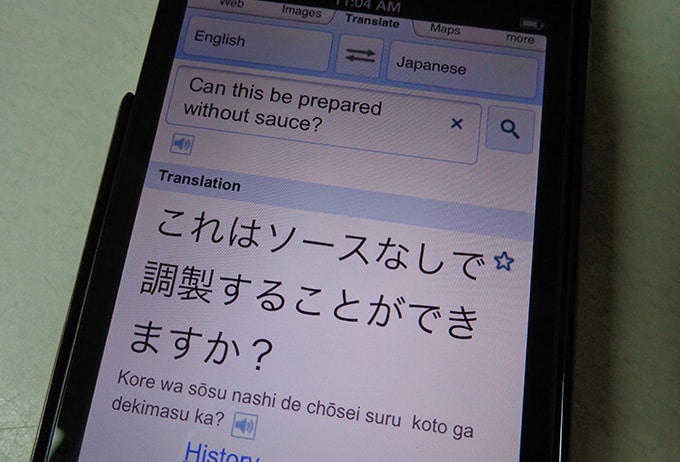
Even before moving overseas, I loved to travel. Maybe that is why I was so open to dropping everything and moving to the tiny island of Terceira back in 2009 when my husband received orders there. It’s been just over three years since we first left the U.S. and we now live in Japan. I have learned a lot about traveling and dietary needs in those short years.
After visiting over 10 non-English speaking countries, I have picked up a few tricks and tips for getting what I want—and, more importantly, avoiding what I don’t want.
I won’t go in to my specific dietary needs, but for you this could range from a preference to a religious food practices, all the way to severe allergies. The stress of not knowing how or what to order can result in not wanting to travel at all. The good news is that it doesn’t need to be that stressful, and many countries now have a good understanding of things like vegetarian or gluten-free. You just need to know a little about the country and culture before you even leave home.
First, research the traditional foods of the country. Look up what ingredients are traditionally in those foods and see if these are things you can include in your diet or wish to leave out. For example, ramen in Japan is traditionally made with a pork broth. Even if you order vegetable ramen or soy sauce ramen, the broth will have been cooked with pork, even if you order it without sliced pork on top. This is considered “vegetarian” because you can’t see the pork. So knowing this in advance means you will be better prepared to either avoid ramen altogether or go armed with a Japanese phrase card to ask if they have any prepared with a vegetable or fish broth (I have personally found ramen I can eat without the pork), rather than just asking if it is “vegetarian.” Since some religions prohibit the consumption of pork, knowing if the country you intend to visit uses pork in traditional dishes can also help avoid a stressful situation.
Second, learn some basics of the language before heading to a new country. Food words are often easy because you can use them without forming a whole sentence and the person will often know what you are asking for. This can be helpful because sometimes phrasing a whole question can lead to getting a response that is beyond your understanding in that language. It is also helpful to know basic phrases that show politeness and respectfulness in the culture you’re visiting. For example, knowing how to say, “Excuse me,” “Thank you,” and, “Please,” can go a long way in getting help finding foods that you can eat.
Third, come armed with phrases that can help you get what you need or ensure you are getting things the way you want. Having a printed out card is useful. And with Google Translate it is easy to make these cards up at home. You may also be able to purchase them online. Another option—and this is the one I do most often because I have an iPhone—is access Google Translate on your phone. If you know you will have internet access in advance, just having Google Translate available is helpful, but if you will not have internet access (unless you find WiFi), type the phrases you want to have on hand in advance and then take a photo/screen shot of these and store in your phone. These photos of the phrases are easily accessible and come in handy. I have had a lot of success communicating with wait staff to make sure my meals come just the way I want.
Fourth, research restaurants in advance. A lot of the fun of being in a foreign country is exploring. You can find great, off-the-beaten-path dining options just by getting lost. However, planning a few meals in advance can alleviate the stress of having special dietary needs in a foreign land. Find restaurants that are near you hotel and the major sights you plan to visit. This way, if you really can’t find something around, you will always have a backup plan that you know will meet your dietary needs.
Finally, when in doubt, always carry a snack with you just in case you get stuck somewhere and can’t find something to eat nearby and quickly. I always carry something as backup, and luckily I rarely ever have to use it.
Take it from this traveler: The world is an amazing place. There are so many languages, cultures, traditions and foods out there. Don’t let your dietary restrictions keep you at home. Get out into the world and be adventurous—but go prepared!


